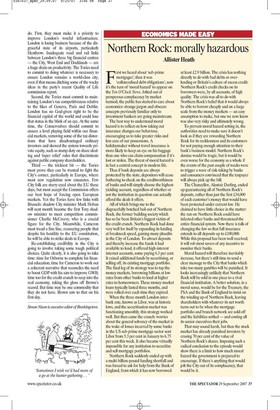Northern Rock: morally hazardous
Allister Heath First we heard about 'sub-prime mortgages'; then it was `collateralised debt obligations'; now it's the turn of 'moral hazard' to appear on the Ten O'Clock News. Jolted out of prosperous complacency by market turmoil, the public has started to care about economics: strange jargon and obscure concepts previously familiar only to investment bankers are going mainstream.
The best way to understand moral hazard is to reflect on how taking out insurance changes our behaviour, encouraging us to take greater risks and less care of our possessions. A holidaymaker without travel insurance is more likely to keep an eye on his baggage than one who can claim compensation if it's lost or stolen. The threat of moral hazard is in fact a central concept in modern life.
Thus if bank deposits are always protected by the state, depositors will cease bothering to check on the creditworthiness of banks and will simply choose the highestyielding account, regardless of whether or not the institution in question can actually afford the deals it offers.
All of which brings me to the disgracefully botched bail-out of Northern Rock, the former building society which has so far been Britain's biggest victim of the credit crunch. Northern Rock had done very well for itself by expanding its lending at breakneck speed, gaining many plaudits in the City of London. To attract deposits and thereby increase the funds it had available to lend, it offered high-interest internet accounts, some paying 6.3 per cent. It raised additional funds by securitising, or selling off, its existing mortgage portfolio. The final leg of its strategy was to tap the money markets, borrowing billions at low rates from other banks to lend at higher rates to homeowners. These money-market loans typically lasted three months, and were rolled over each time they expired.
When the three-month London interbank rate, known as Libor, was at historic lows, and the securitisation market was functioning smoothly, this strategy worked well. But then came the crunch: worries about the general solvency of the market in the wake of losses incurred by some banks in the US sub-prime mortgage sector sent Libor from 5.3 per cent in January to 6.75 per cent this week. It also became virtually impossible for any institution to securitise and sell mortgage portfolios.
Northern Rock suddenly ended up with a multi-billion-pound funding shortfall and was forced to ask for help from the Bank of England, from which it has now borrowed at least £2.9 billion. The crisis has nothing directly to do with bad debts or overlending or Britain's culture of excess credit: Northern Rock's credit checks on its borrowers were, by all accounts, of high quality. The crisis was all to do with Northern Rock's belief that it would always be able to borrow cheaply and on a large scale from the money markets — an easy assumption to make, but one we now know was also very risky and ultimately wrong.
To prevent moral hazard setting in, the authorities need to make sure it doesn't look as if they are rewarding Northern Rock for its recklessness and its customers for not paying enough attention to their bank's business model. Northern Rock's demise would be tragic; but it would be even worse for the economy as a whole if the events of the past couple of weeks were to trigger a wave of risk-taking by banks and consumers convinced that the taxpayer will always pick up the bill.
The Chancellor, Alastair Darling, ended up guaranteeing all of Northern Rock's deposits, rather than just the first £34,000 of each customer's money that would have been protected under current law. He claimed to have little choice in the matter: the run on Northern Rock could have infected other banks and threatened the entire financial system. Now there is talk of changing the law so that full insurance extends to all deposits up to £100,000. While this proposal has been well received, it will rob most savers of any incentive to monitor their banks.
Moral hazard will therefore inevitably increase, but there's still time to send a clear message to the City that banks which take too many gambles will be punished. It looks increasingly unlikely that Northern Rock will be sold in one piece to a rival financial institution. A better solution, in a moral sense, would be for the Treasury, the FSA and the Bank of England to insist on the winding up of Northern Rock, leaving shareholders with whatever its net worth turns out to be when the mortgage portfolio and branch network are sold off and the liabilities settled — and costing all its senior executives their jobs.
That may sound harsh, but then the stock market has already punished investors by erasing 70 per cent of the value of Northern Rock's shares. Imposing such a radical conclusion to the episode would show there is a limit to how much moral hazard the government is prepared to encourage. If there's anything that would jolt the City out of its complacency, that would be it.























































 Previous page
Previous page